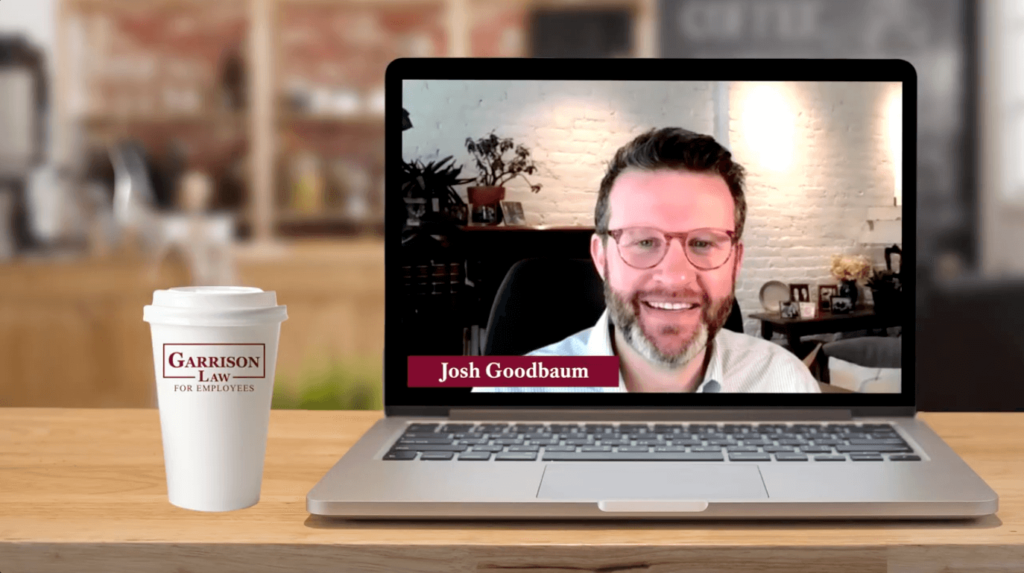Amanda DeMatteis: Hi, Josh.
Josh Goodbaum: Hi, Amanda. What are we talking about today?
DeMatteis: I thought we would talk about whether or not an employee can sue their former employer in secret. If you have claims stemming from some type of illegal employment activity that happened at work, and you want to hold your former employer or your current employer responsible for those illegal acts, can you do so without that being a matter of public record?
Goodbaum: We get this question a lot, Amanda, because there is a stigma associated with suing your employer, and it doesn’t do anybody a service to pretend otherwise. There’s often a stigma with being a plaintiff in an employment discrimination or retaliation case, or a sexual harassment or sexual assault case, or lots of other kinds of cases. So, there are many people who might want to exercise or pursue their rights , but don’t want to do so publicly with their names attached to their lawsuit for fear of the effect on their career.
The answer to your question, Amanda – “Can you sue secretly or in private or using a John Doe or a Jane Doe instead of your name?” – is: No, usually you can’t. And the reason is that there’s a presumption of public access to the courts. The taxpayers pay for the courts. They’re entitled to monitor the courts. We’re all entitled to visit or attend those courts anytime we want to. You could just go to a courthouse and sit in the audience and watch trials taking place. And that presumption of public access is protected by the First Amendment and can only be overridden in certain, very limited circumstances.
So, the way it works is that we would file a lawsuit, and then we would file a motion. It’s called a motion to proceed pseudonymously, meaning with another name – a pseudonym – and the court would use a variety of factors to evaluate that motion. None of the factors is dispositive. The factors might include: Is the nature of the claim highly sensitive, like does it involve something sexual or something medical? Would the identification of the plaintiff pose a risk of physical or mental injury to the plaintiff? Is the plaintiff someone who’s particularly vulnerable? Do they have a diagnosed mental illness? Is it a minor, for example, or a person of diminished capacity? Has the plaintiff maintained efforts to keep their identity confidential? (You’re gonna have a hard time convincing a court to allow you to proceed with the pseudonym if you’re out holding a press conference in front of the courthouse.) And likewise, the court’s gonna want to know about the prejudice to the defendant and to the public, which has a right to know.
The ability to sue secretly or privately is most commonly granted in cases that involve sexual assault or sexual harassment. You and I have both done cases like that where we have had a client who’s been sexually assaulted and we have kept their identity secret and they have proceeded as a Jane Doe in court. They’ve never been identified publicly. So if you have been subjected to sexual harassment or sexual assault, you should speak with a lawyer about your rights.
The takeaway here is, if you decide that you want to sue your employer, the default is that you have to do it publicly, with some important exceptions.
There is one caveat that’s important to understand, Amanda, and that is the existence of arbitration. Lots of employees sign arbitration clauses when they join their employer or at some point during their employment. Arbitration is a private dispute resolution process. We’ve done some other videos about arbitration, Amanda, but arbitration is something that, even if a plaintiff is not required to use, they could potentially agree with the defendant to use if they want. That’s something, of course, that you want to discuss with your lawyer once the time comes.
DeMatteis: Interestingly enough, we’re seeing this play out publicly in recent months, Josh, with people who are coming forward with sexual assault allegations against Sean ‘Diddy’ Combs or other celebrities who are trying to do so under a pseudonym, and some courts are saying, “No, you can’t do that. You, in fact, have to identify yourself in order to proceed with this case publicly.” So, interesting to see something that we deal with in employment law pretty regularly play out publicly.
Thank you so much for that information, and thank you for watching. We’ll see you next time.

